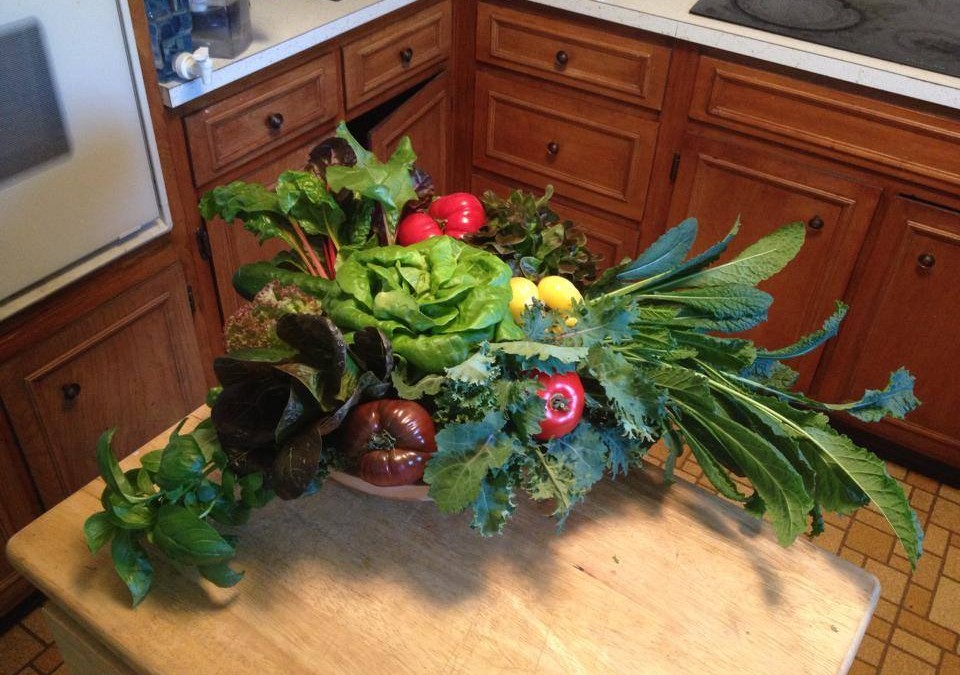
by andre | Mar 13, 2015 | Blogs, Daily Change, Stories |
Edible gardens evoke multiple memories for me, ranging from distant childhood recollections of our family’s garden in the backyard behind the garage, to more recent ones of holidays with my in-laws. My parents-in-law have grown a garden for decades, and when I visit I often get to enjoy fresh produce: green peppers, cucumbers, zucchini, beans, and squash. When I lived in New York City, my wife and I would often spend Saturday mornings walking to our neighborhood farmers market in Sunnyside, Queens. We grew to enjoy the delicious variety of local foods: crisp apples from upstate New York, juicy peaches, and farm-fresh tomatoes.In addition to enjoying the diversity and quality of the food at the farmers market, we also appreciated knowing where each item came from and directly interacting with those folks involved in transporting our food. So when we moved to a suburb of Denver in 2013, we wondered if we would be limited in our food choices to what was available at our local supermarket.While we are currently within easy biking distance (and even easier driving distance) to several grocery stores and organic food stores, not everyone in the Denver metro area is as fortunate to have access to affordable and nutritious food. Many neighborhoods in Denver can be classified as “food deserts,” areas where grocery stores are virtually nonexistent and fresh fruits and vegetables are extremely rare. Go here for a map of Denver food deserts. These food deserts not only affect the people living in the area–they also have an impact on our public health (for more information, go here to read the University of...
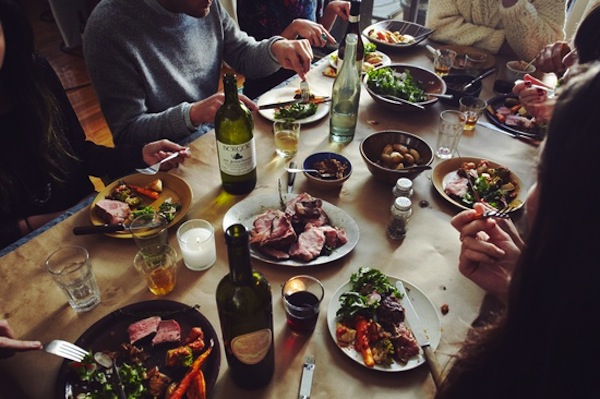
by andre | Mar 12, 2015 | Blogs, Daily Change, Stories |
Socializing hinges upon consumption, well at least it does for many of us. All too often, the scene of good times conjures the commercial of friends sharing beer or ordering each other drinks at a bar, or sharing a nice meal out. I love to bask in the glory of a dish cooked to perfection. I love it even more when the tastes are shared over banter and story time amongst friends. Food has a funny way of bringing us together. If we’re cowboys, the sound of the dinner bell brings us home. Ice cream truck tunes bring us and any kid on the block to at least look toward the street, if not race out curbside, to fork over our dollars for a cold treat. We gather around the fire to roast marshmallows and make smores while sharing scary stories. It’s not that we only gather to eat, or that we eat to gather; rather, we know that food enhances the gathering and vice versa. Friends make the food more savory, each bite sweeter, as does the food make your buddies’ jokes just a tad more funny. We adopt norms and etiquettes in how we communicate and express ourselves to one another as friends. There is an amount of social capital built in our food behaviors. Food is glue that can certainly bind but also stand in the way of relationships. On one hand, hospitality outwardly fosters the establishment and strengthening of bonds; however, one can see how a lack of dietary agreement or access to food can create obstacles to relationships. Food can highlight some serious social inequalities influenced by class, race, and gender. It’s pretty difficult for a...
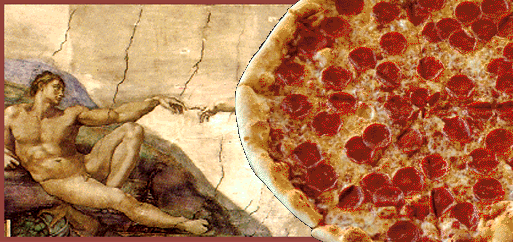
by andre | Mar 11, 2015 | Blogs, Daily Change, Stories |
What’s your relationship with food? Is it something to be enjoyed, or just fuel for living? Do you know where it comes from? Are you a foodie, hunting for the latest and tastiest? Maybe you crave food. Maybe you respect it. Maybe you’re afraid of it. With just a handful of days remaining in our advocacy for hungry children, my relationship with food feels like it’s in flux. In my life I’ve almost never wondered where my next meal would come from. Food has always been ready to hand, available to fill my stomach and tickle my tongue. I’ve always taken it for granted. Have you ever been in a relationship where you’ve been taken for granted? It doesn’t feel good. Today I can’t assume the coming of my next meal. We missed our first one last weekend. Of course our deprivation is both time limited and voluntary—stark and meaningful differences compared to the 800 million people who don’t have enough to eat day in and day out. Nevertheless, going without food, and not knowing when that will happen, changes my relationship with it. I’m now much slower to simply assume I’ll go to bed with a full stomach. Another thing that has changed is my ability to choose. It used to be, my only concerns were: What kind of food will I eat today? When, and how much? When having food goes without saying, then these questions are what we say instead. My relationship with food has been one of boundless consumerism: this, not that. Now, not later. But today, I can’t make those decisions. The ingredients and...

by andre | Mar 10, 2015 | Blogs, Stories |
Dieting doesn’t work. Countless studies have shown that short term gains from any number of fad diets are lost when the interval to recheck weight and general health is extended much beyond six to twelve months. By the numbers: $20 Billion: The annual revenue of the U.S. weight-loss industry, including diet books, diet drugs and weight-loss surgeries. 108 Million: The number of people on diets in the United States. Dieters typically make four to five attempts per year. 85 %: The percentage of customers consuming weight-loss products and services who are female. 1 Hour: The amount of time spent on daily exercise by people who lost and kept off at least 30 pounds of excess weight for five years. 95%: The percent of dieters who will regain all their weight in 5 years. So what’s the problem? Well there are a lot. Let’s look at a few: We are designed to avoid starvation, not obesity. When we restrict our calories below our metabolic needs, our bodies turn down the thermostat, slow the metabolism, and still store energy in the form of fat. Our ancient ancestors who determined our genetic heritage depended on the land for their food and thus suffered times of feast and famine. In times of feast, they got fat. In times of famine, they burned that fat and didn’t die. We are pre-programmed to enjoy food. And certain foods up that enjoyment level to addictive heights. From my friend Mark’s blog on food addiction a few days ago: “Food addiction is driven by the same neurotransmitters as drug addiction. The dopamine reward is our brain’s way of saying “That feels good....
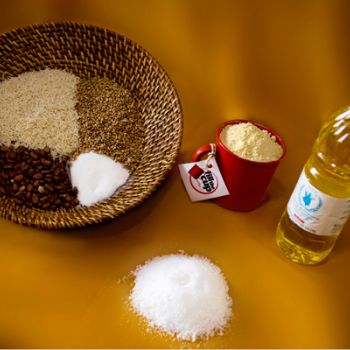
by andre | Mar 8, 2015 | Daily Change, Stories |
There are a lot of books being written these days about the importance of being radical. There are different variations, but the main idea is that God is calling us to be world changers in extraordinary ways. Over the years, I’ve felt drawn to this message, and I always thought of myself as a world changer. I told my wife recently that I’m finding satisfaction in the ordinariness of my life. I feel called to be faithful to God in simple, ordinary ways, that I don’t think anyone would mistake for radical or world-changing. Parent, spouse, friend, lawyer. I’m skeptical of causes that oversimplify complex problems. I’m kind of cynical about our capacities to truly effect change in any global sense. Am I getting you down yet? Over the past 17 days, I’ve been working with this crazy little non-profit called 25 in Change. We’ve been on a journey of advocacy, eschewing our normal daily diets for three small meals of rice and beans, and only when someone has donated $25 to provide food to children. It’s an experience that some people would consider unorthodox, maybe even a bit radical, but it has actually been a life giving journey into ordinary, everyday advocacy… moving toward empathy and connection with people experiencing malnutrition or overnutrition. There are people in our spheres of influence who struggle to feed their kids, families who are anxious about putting nutritious food on the table. There are young kids who struggle to concentrate in school because they’re eating junk food and soda for breakfast. A couple of times during 25 in Change, I’ve been...
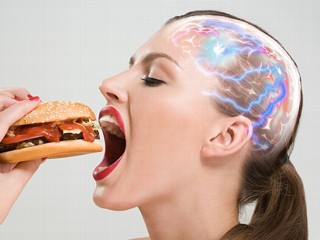
by andre | Mar 6, 2015 | Daily Change, Stories |
Nelson sat across from me talking about bread. That was what he missed most—more than candy, more than oily buttered popcorn. But he had to avoid bread, he said, because that was what was keeping him from losing weight. He currently weighed 290 pounds and was less than six feet tall. That put him squarely in the obese category, but it was significantly better than the close-to-400 pounds he had weighed not long ago. Nelson’s surgery to reduce the size of his stomach had produced dramatic results, but he had started gaining the weight back, and was worried he had flushed thousands of dollars in medical expenses down the drain. Nelson was in my office to talk about his food addiction. As a therapist, I work with addiction all the time. I regularly treat people who are addicted to drugs and alcohol. But I also help people who are addicted to pleasurable everyday things like shopping, sex, work, the internet, gaming, and food. Food addiction is driven by the same neurotransmitters as drug addiction. The dopamine reward is our brain’s way of saying “That feels good. Do more of that.” Our ancestors needed that message to get them to consume foods like fat, sugar, and carbs, and we developed preferences for the tastes and mouthfeel they produce. Those foods were necessary to fuel a days-long hunting journey. But necessary for eight hours at a desk? Followed by four hours in front of the TV? Not so much. For people like Nelson, the dopamine reward system has been hijacked by their emotional life. While pizza tastes good...
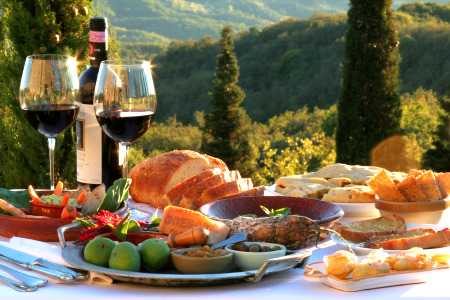
by andre | Mar 5, 2015 | Stories |
Can you think of a better expression of culture than food? Yes, languages, music, dance and clothing often flash across your thoughts when you consider cultures, but the food from distant lands often draws us in to delve deeper. After all, we are what we eat, or as Jean Anthelme Brillat-Savarin states, “Tell me what you eat, and I’ll tell you who you are.” What we eat, the tastes and aromas of what we crave, are the culmination of years and often generations of experience. Those experiences may include a foundation in the land of our ancestral origins, the adaptations our ancestors made after migration, the cultural contexts of rustic versus cosmopolitan roots, generational poverty versus affluence, or a heritage of enslavement versus freedom. These parts of life impact what we eat, how we get our food, who cooks our food, who we share our food with and in what order. Taking part in 25inchange.org has reminded me that most of our socialization and culture centers around food. So much so that food has become an obsession for Millennials and the Gen-Xers creating a ‘foodie’ culture. The pursuit of amazing food as exotic and authentic and organic as possible becomes a bloodlust for foodies. The true foodie has a list of new restaurants to try, photo-documents and actively share their opinions of dining experiences via social media and restaurant rating apps. My parents always asked a question rooted in the writings of Dick Gregory, “do you live to eat or eat to live?” I would often respond glibly, thinking how miserable life would be if you can...
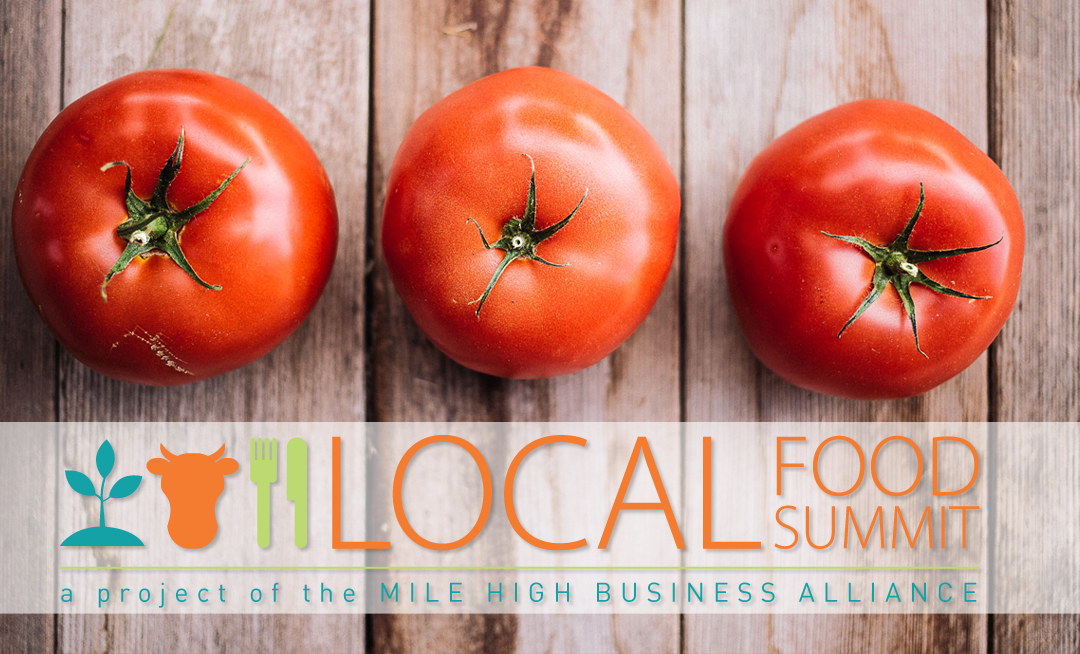
by andre | Mar 4, 2015 | Daily Change, Stories |
Over days 13 and 14, while eating only rice and beans, I had a unique opportunity to see the diversity of food which can be sourced primarily from local establishments and farmers in the middle of a Colorado winter. During these last two days, I’ve been at the Local Food Summit in Denver. About 400 Denver local food professionals had the chance to speak to one another, share our perspectives with elected officials of the city and state, and find a new direct contact for fresh organic food such as Lion’s Mane mushrooms grown in the middle of winter. Keynote Speakers at the conference included Chef Ann Cooper, Alan Lewis of Natural Grocers, and Mayor Michael Hancock; all of them spoke about the necessary and real transformation of our food system that is taking place today and how much is still left to do. During the summit, I spoke with the winning chef of the competition among professionals for who could cook the best locally-procured meal for a judges-panel of other chefs. She won with her Ricotta and Herb Stuffed Chicken Leg, topped with a palisade peach preserve reduction sauce; the plating was beautiful, I can only imagine it tasted as good as it looked. As we spoke about her dish and she flipped through closeup pictures—on day 14 of eating only rice and beans, all I could do was stare at her amazing meal—and not a casual stare. It was a lusty gawking like a newly pubescent boy seeing girls differently for the first time. Gandhi once said “There are people in the world so hungry, that God cannot appear to them except in the form of bread.” In that humanely raised organic...
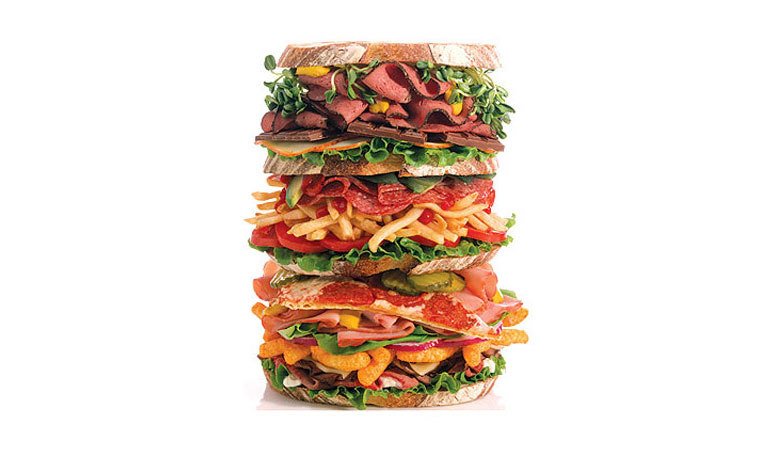
by andre | Mar 1, 2015 | Daily Change |
In junior high school, I had a craving. For food. Junk food. After Little League baseball practices full of ground balls and hook slides, line drives and double plays, I’d eagerly anticipate a ride to the nearest convenience store. Entering the temple of delights, I’d dash to the back and fill up a large cup with a spritz of every variety of soda on the soda machine (a drink my friends dubbed—perhaps all-too-aptly—a “suicide” drink). Complement that with a bag of crunchy “onion rings” and things got better. To top it off, with any leftover change, I’d scoop up a glazed “apple pie” packed with a gooey filling of, er, “apples.” Excuse me while I wipe the drool off of my keyboard. Now, while I no longer eat this way as an adult, why is it that when writing this I had to pause when I realized my mouth was watering when describing it? What is it about food laden with salt, fat, and sugar that has such a visceral pull on me, years later? I’m certain that more and more consumers are becoming aware about the health costs of junk food. Yet major food corporations continue to manufacture junk food of all varieties in response to consumer demand, designing and marketing products with “sensory-specific satiety“and “vanishing caloric density.” From hidden sugars in yogurt and pasta sauce to fast-food salads with more calories than burgers, our system of food production and consumption is broken in countless ways. And yet it still reaps enormous financial profits for the food industry. I’d guess that many well-read and thoughtful folks implicitly sense that junk...
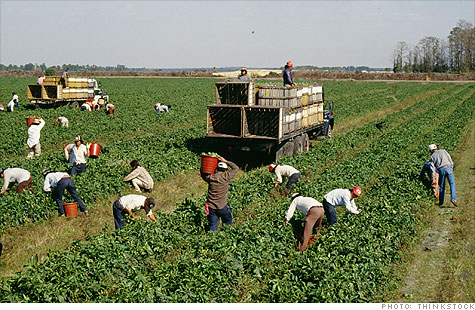
by andre | Feb 28, 2015 | Stories |
The United States’ food system depends on a group of people who receive some of the fewest benefits and protections in American labor: migrant farmworkers. Every year, 2-3 million laborers perform agricultural work throughout the U.S., traveling and living in temporary housing. According to the U.S. Bureau of Labor Statistics, agriculture is one of the most dangerous industries in the nation, subjecting its workers to heat stress, long hours, equipment injuries, and toxic chemical injuries. For their work, 75% of migrant farmers earn less than $10,000 annually. Three quarters of all farmworkers in the U.S. are foreign born. They come to America to escape frequently dehumanizing conditions in their home countries. My friend Josh tells the story of living in Mexico and seeing the living conditions of farmers working in a big name-brand plantation: “The company-provided housing was little more than dirt floors, stick frames, and black plastic covering. Families of three to eight people would sleep in these 8′ x 8′ rooms with little protection from the rain, cold, heat, or exposure.” And these workers were regularly exposed to toxic chemicals because airplanes would spray pesticide while they were in the field. But too often migrant farmers flee utter deprivation only to enter into exploitation. In the U.S. it’s common to be paid pennies for each pound of crops harvested, in part because the law excludes agricultural workers from the right to join trade unions, which keeps wages artificially low. Add to that the threat of deportation for many immigrants if they complain about wages, conditions, or benefits—to say nothing of intimidation, illegal wage manipulation, or debt bondage—and...
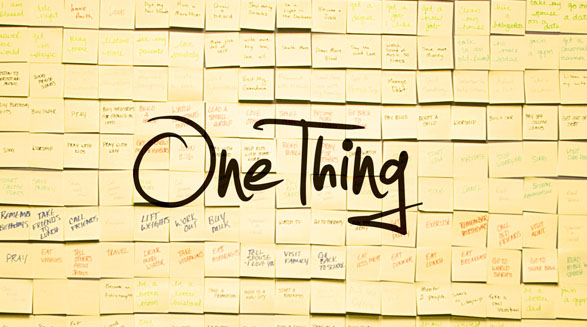
by andre | Feb 27, 2015 | Stories |
Do one thing. Just one thing. I can’t tell you what that one thing is. Over these 25 days you will see lots of information from smart, thoughtful people. They will point you to other smart, caring, committed people with novel and innovative ideas and small or large projects that are reshaping the global food system. Together, the one thing that that person does adds to the one thing that that organization does and the whole of it pushes together to change the course of the future of food. That sounds like a big goal, and it is. If you start doing research on the internet, you could quickly get bogged down with “40 organizations that are changing urban agriculture”, “24 TED talks that will change your mind”, or “101 encouraging facts about the food system in the last year.” Just choose one thing. I’ll share with you what my family did and has been doing. Maybe it will connect with you, maybe it won’t. Maybe Andre’s blog about micronutrients or Nabeeh’s post about brain food will interest you more and lead you to action. That’s great. Just do one thing. Our first thing was to join Door to Door Organics after we did 25 in Change. This was a choice we made in favor of improving our diets after we spent 25 days being gluten-free vegans, a dramatic departure from our bread, butter, sugar, and meat-loving former selves. We loved receiving a wide variety of fruits and vegetables on our doorstep and we felt that the source was important to our new-found values (see the...











